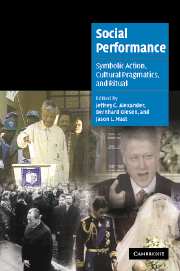Book contents
- Frontmatter
- Contents
- List of figures
- List of tables
- List of contributors
- Introduction: symbolic action in theory and practice: the cultural pragmatics of symbolic action
- 1 Cultural pragmatics: social performance between ritual and strategy
- 2 From the depths of despair: performance, counterperformance, and “September 11”
- 3 The cultural pragmatics of event-ness: the Clinton / Lewinsky affair
- 4 Social dramas, shipwrecks, and cockfights: conflict and complicity in social performance
- 5 Performing a “new” nation: the role of the TRC in South Africa
- 6 Performing opposition or, how social movements move
- 7 Politics as theatre: an alternative view of the rationalities of power
- 8 Symbols in action: Willy Brandt's kneefall at the Warsaw Memorial
- 9 The promise of performance and the problem of order
- 10 Performance art
- 11 Performing the sacred: a Durkheimian perspective on the performative turn in the social sciences
- Index
- Cambridge Cultural Social Studies
- References
2 - From the depths of despair: performance, counterperformance, and “September 11”
Published online by Cambridge University Press: 07 December 2009
- Frontmatter
- Contents
- List of figures
- List of tables
- List of contributors
- Introduction: symbolic action in theory and practice: the cultural pragmatics of symbolic action
- 1 Cultural pragmatics: social performance between ritual and strategy
- 2 From the depths of despair: performance, counterperformance, and “September 11”
- 3 The cultural pragmatics of event-ness: the Clinton / Lewinsky affair
- 4 Social dramas, shipwrecks, and cockfights: conflict and complicity in social performance
- 5 Performing a “new” nation: the role of the TRC in South Africa
- 6 Performing opposition or, how social movements move
- 7 Politics as theatre: an alternative view of the rationalities of power
- 8 Symbols in action: Willy Brandt's kneefall at the Warsaw Memorial
- 9 The promise of performance and the problem of order
- 10 Performance art
- 11 Performing the sacred: a Durkheimian perspective on the performative turn in the social sciences
- Index
- Cambridge Cultural Social Studies
- References
Summary
Introduction
After introducing a perspective on terrorism as post-political and after establishing the criteria for success that are immanent in this form of anti-political action, this essay interprets September 11, 2001 and its aftermath inside a cultural-sociological perspective. After introducing a macro-model of social performance that combines structural and semiotic with pragmatic and power-oriented dimensions, I show how the terrorist attack on New York City and the counterattacks that immediately occurred in response can be viewed as an iteration of the performance/counterperformance dialectic that began decades, indeed centuries, ago in terms of the relation of Western expansion and Arab-Muslim reaction. I pay careful attention to the manner in which the counterperformance of New Yorkers and Americans develops an idealized, liminal alternative that inspired self-defense and outrage, leading to exactly the opposite performance results from those the al-Qaeda terrorists had intended.
To understand the sociological processes that created “September 11” (hereafter also referred to as “9/11”) and what transpired politically, morally, and humanly during that tragic time and its aftermath, and also to understand how to prevent a tragic eternal return, we must reflect on the theoretical presuppositions that underlie our empirical perceptions. We need to theorize terrorism differently, thinking of its violence less in physical and instrumental terms than as a particularly gruesome kind of symbolic action in a complex performative field.
- Type
- Chapter
- Information
- Social PerformanceSymbolic Action, Cultural Pragmatics, and Ritual, pp. 91 - 114Publisher: Cambridge University PressPrint publication year: 2006
References
- 17
- Cited by

